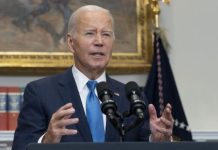
March 4 (UPI) — U.S. health officials told Congress on Tuesday they will ramp up testing for COVID-19 — with the capacity to perform as many as 1 million tests a day — as 108 cases and nine deaths were confirmed in 15 states.
During a briefing from the White House coronavirus task force, Vice President Mike Pence said new guidance from the Centers for Disease Control and Prevention makes clear that any American can be tested without question, no longer restricting tests to people exhibiting symptoms.
He added that testing kits will be shipped out imminently with a plan for 1 million people to be tested next week and that the task force will move all inspection resources at the state level to dealing with infectious disease.
There are indications there could be hundreds more COVID-19 cases in the United States, health officials said, particularly in heavily populated areas like Florida, Atlanta and New York City — all of which reported new cases Tuesday. The nine deaths have all been in Washington state.
In Washington, officials confirmed Tuesday that two more residents of the Life Care Center long-term care facility in Kirkland died from the disease. There have been no details released on the ninth death.
In Georgia, Gov. Brian Kemp late Monday confirmed the state’s first two cases of COVID-19, in a husband and wife who had recently returned from Italy. The announcement comes days after he formed a new coronavirus task force to assess the state’s readiness to respond to cases of the disease.
And a third presumptive positive case of COVID-19 has been found in Florida, Gov. Ron DeSantis said Tuesday. The patient is a woman, and is the sister of a Hillsborough County woman who tested positive Sunday following a trip to Italy. The newly diagnosed person was on the trip as well.
New York City, which reported its first case Monday, in a woman who had traveled to Iran, added its second case less than 24 hours later in a man who works in the city but lives in Westchester County. The Transit Workers Union, which represents employees operating the city’s subway system, said its members have been tasked with enhanced cleaning measures, which include disinfecting the interiors of all trains and buses every 72 hours.
Two schools in New York — one in the city and the other in the northern suburbs in Westchester County — were also reportedly closed Tuesday over COVID-19 fears, although no details have been provided.
At a hearing of the Senate’s Committee on Health, Education, Labor and Pensions, officials from the Food and Drug Administration, CDC, Department of Health and Human Services and National Institute of Allergy and Infectious Diseases faced questions from lawmakers of both parties on the government’s response to the coronavirus outbreak.
“It is a new virus, and it is capable of person-to-person spread,” said Anne Schuchat principal deputy director at the CDC. “If sustained person-to-person spread in the community takes hold outside China, this will increase the likelihood that the [World Health Organization] will deem it a global pandemic.”
Among the criticisms was the apparent failure to distribute adequate — and accurate — testing equipment to public health labs and healthcare facilities quickly enough in the face of the outbreak.
“We have partnered with private industry to scale up production,” FDA commissioner Stephen Hahn said of the COVID-19 tests at the hearing. “We’re now looking at about 500 tests per kit.”
Although the CDC “moved rapidly to develop a test,” Hahn said, there were problems with the initial test kits distributed to state labs nationally.
That problem has been addressed but, collectively, just over 500 Americans have been tested — a small number compared to countries like South Korea, which has tested more than 125,000 people since their first case of the disease was confirmed there two weeks ago.
For this reason, experts have suggested that many more Americans may have been sickened with COVID-19, without even knowing it.
An analysis performed by researchers at Fred Hutchinson Cancer Center at the University of Washington in Seattle, theorizes that several of the cases there, which have been centered in a long-term care facility in the suburb of Kirkland, have genetic links with cases identified in Wuhan, China — the epicenter of the outbreak — in early January.
The researchers said their findings show the virus has potentially been circulating in western Washington state for several weeks, and that as many as 1,500 area residents may have been infected. They also argued that earlier availability of an accurate test in the region could have prevented the outbreak there, which has claimed nine lives.
“It’s an interesting hypothesis, but just a hypothesis at this point,” Nancy Messonnier, director of the CDC’s National Center for Immunization and Respiratory Diseases told reporters during a separate press briefing Tuesday.
At the same time, similarly early findings, published Tuesday in the agency’s Morbidity and Mortality Weekly Report, note that COVID-19 may not spread as rapidly or easily as the flu. The results indicate that those who have the virus, but don’t have symptoms, may infect less than 0.5 percent of their “close contacts,” while those who have symptoms may infect up to 10.5 percent of those they come in contact with. Messonnier cautioned, however, that these findings are based on results from a small sample of patients.
President Donald Trump on Tuesday donated his quarterly salary to the Health and Human Services Department to “support efforts being undertaken to confront, contain and combat” the virus, White House press secretary Stephanie Grisham wrote on Twitter.





